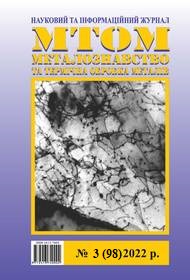STRENGTHENING OF PIPE-PRESSING TOOLS FOR THE PRODUCTION OF CORROSION-RESISTANT PIPES USING CHEMICAL AND THERMAL TREATMENT
DOI:
https://doi.org/10.30838/J.PMHTM.2413.270922.42.904Keywords:
: tool; matrix ring; mandrel needle; microhardness; wear resistance, pressingAbstract
Problem statement. In the production of corrosion-resistant pipes at pipe-pressing plants, the low durability of the pipe tool is a burning issue. High mechanical properties of the tool and its heat resistance (redness resistance) are achieved due to alloying and heat treatment. However, the “traditional” means of increasing wear resistance (hardening with tempering, thermomechanical processing) are almost exhausted. Therefore it is of some interest to develop and correct thermal and chemical-thermal treatment methods in order to increase the wear resistance of the tool. Chemical and thermal treatment is an effective way of changing the surface layer composition for a stamping tool to provide the necessary set of properties for its working surface. This changes the structure and properties of the surface layer and increases the strength, wear and heat resistance of the steel through the formation of carbides, nitrides, borides, etc. that are stable during heating process. Conducting carbonitridation in melts of cyanate salts and carbonates for matrix rings of complex matrices and mandrel needles for pressing pipes on pipe profile presses significantly increases the durability of the tool due to high indicators of surface hardness, fatigue strength by 50…60 % due to the creation of compressive stresses on the surface; improves the surface quality of the tool itself and, as a result, the quality of corrosion-resistant pipes inner surface. Ionic nitriding (compared to furnace nitriding) has the following advantages: it accelerates diffusion processes by 1,5−2 times; allows to get a diffusion layer of adjustable composition and structure; characterized by slight deformations of products and a high class of surface cleanliness. The purpose of the article – to show the expediency of using modern chemical-thermal treatment technologies (carbonitridation, ionic nitriding), which increase the hardness and wear resistance of the tool, which ensures the quality of corrosion-resistant pipes inner surface and reduces the costs of processing the pipes manufacture, as well as the effectiveness of building a mathematical model of the distribution of microhardness in surface layers of the tool after chemical and thermal treatment with the help of applied computer programs “MathCad”, “Excel”. Conclusions. Due to the low durability of the pipe press tool, there was a need to improve the strengthening technologies of the pipe tool, optimize the modes of such technologies, and develop new strengthening methods. Conducting chemical-thermal treatment after hardening and tempering of tool steel Х40CrMoV5-1-1and 30WCrV17-2 (carbonitridation, ion nitriding) significantly increases the operational properties of the tool and its service life by 25…30 %, as well as the quality of its surface, which significantly increases the quality of corrosion-resistant pipes inner surface.
Downloads
Published
Issue
Section
License
Authors that are published in this journal agree to follow the conditions:
Authors reserve the right to the authorship of his work and cede the right to the journal of first publication of this work on conditions of the license under the Creative Commons Attribution License, which allows others to distribute it freely with the obligatory reference to the author of the original work and the first publication of the work in this journal.

